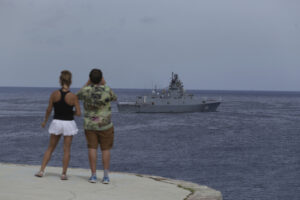NYU Law Event: Iran, ISIS, and the Future of Gulf Security

Iran, ISIS, and the Future of Gulf Security
March 2, 2015 Furman Hall | The Center on Law and Security | NYU School of Law
Moderator: Zachary Goldman, Executive Director, Center on Law and Security, NYU School of Law
Speakers:
Admiral William Fallon, U.S. Former CENTCOM Commander
Suzanne Maloney, Senior Fellow Saban Center for Middle East Policy, Brookings Institution
Elizabeth Rosenberg, Senior Fellow & Director of the Energy, Economics and Security Program, Center for a New American Security
Steven Simon, Middle East Institute
This past Monday, the NYU School of Law hosted an esteemed panel that brought substantial expertise on security issues in the Persian Gulf to a full room of students and alumni. The presentation focused on two issues: ISIS and the Iranian nuclear deal.
Admiral William Fallon, Former Commander of US Central Command (CENTCOM) and Steven Simon, Senior Fellow of the Middle East Institute (MEI) addressed the issues surrounding ISIS: primarily, the formation of ISIS, the instability of divergent interests within the group, and the lasting impact the group has had on the region. Throughout the discussion, Admiral Fallon offered valuable insight and made two especially notable points. First, he reiterated a well–known, yet still disputed fact: the current administration has no interest in putting boots on the ground. It seems the entire Executive Branch is of the persuasion that deployment will be counterproductive, saying nothing to how the American people feel about a return to Iraq.
The second comment of his that I found particularly insightful was rooted in his expertise and experience in the military. Admiral Fallon spoke to the efficacy of air strikes, applying a more nuanced analysis than the purported experts who, pleased with their own perceived discernment, exclaim that air strikes will not eliminate ISIS. In fact, air strikes are quite effective in the open desert stretches between Iraq and Syria, limiting ISIS’s ability to move supplies quickly and easily from its many fronts. A key element of their success has been the ability to move fluidly against two governments that are both unwilling and unable to coordinate. If ISIS finds its fortunes quickly reversed on one front, the group will have great difficulty in reinforcing the other front.
Suzanne Maloney of the Brookings Institution and Elizabeth Rosenberg of the Center for a New American Security (CNAS) then spoke to the regional attitudes on the Iranian nuclear deal. On the deal itself, there seemed to be agreement among panelists that this is a historic opportunity. The P5+1 has never really agreed on anything before, so they expect this cooperation to eventually fray. Furthermore, the deal will only address the nuclear issue. American allies in the region might worry (described as “conspiratorial thinking”) that the deal will lead to rapprochement on other thorny issues, such as support for Iranian sponsored terrorism, human rights abuses or the even the regional balance of power. According to Mses. Maloney and Rosenberg, the nuclear deal will not have this emboldening effect on the Islamic Republic.
Returning to the attitudes of regional actors, both Israel and Saudi Arabia worry that if the United States alleviates sanctions against Iran, the most able country to stem Iranian influence in the Middle East will be unwilling to do just that. First, the U.S. will have lost its primary lever of punishment against Iran. The aforementioned activities, not to forget Iran’s actions in Lebanon, Gaza, Iraq, and Yemen will not be confronted. Furthermore, regional players can only expect Iran to gain more power and influence as its economy begins to take full advantage of entering the globalized market. Saudi Arabia and Israel worry about a hegemonic Iran with nuclear capability as a deterrent, or down the road, a preemptive strike option. Both countries feel the United States is not living up to its promises as guarantor of regional security, at least according to their interests. Despite their protests, though, neither country has suggested a better policy.
Between the sometimes dry reading of events by academics and the simplistic “analysis” of some in the media, the panel was a refreshing reminder that there are a host of well-spoken, intelligent individuals from government to think tanks who are willing—and eager—to engage with students on important international issues.
M.A. Candidate, Politics




